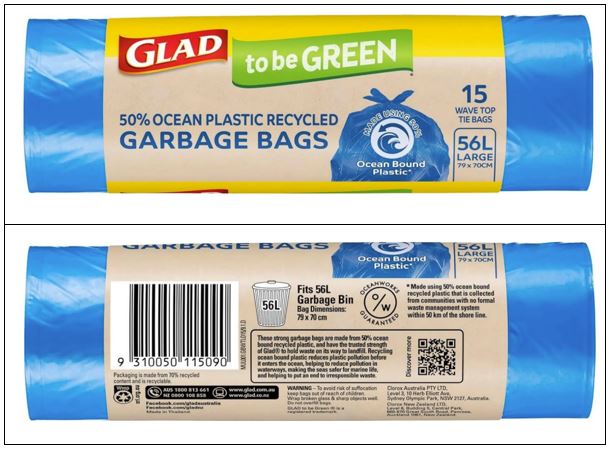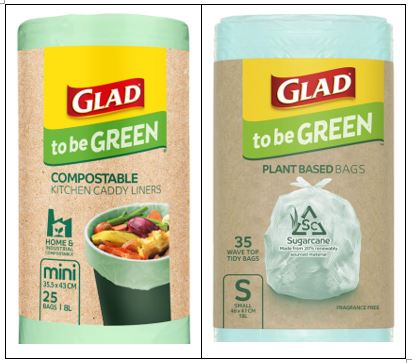GLAD bags are made from ‘50% ocean plastic’. This is a powerful green marketing claim when marine plastic pollution is a serious global concern, affecting fish, seabirds and marine mammals.
The claim is that GLAD bags are made from recycled plastic collected from the ocean, ‘50% ocean plastic’ to be precise. By making this claim, Chlorox, the maker of GLAD bags, attracts consumers to buy GLAD bags because they are environmentally friendly, and shows consumers that Chlorox takes environmental sustainability seriously.
But was this greenwashing? Greenwashing is making false or misleading environmental claims about products or services. Claims which are in breach of the Australian Consumer Law.
The Australian Competition & Consumer Commission (ACCC) says it was and has commenced legal proceedings against Chlorox.
This article is sourced from the ACCC media release: GLAD bags manufacturer in court for ‘50% ocean plastic‘ claim and from the concise statement filed by the ACCC in the Federal Court of Australia.
Legal Proceedings against Clorox
The proceedings are brought by the ACCC against Clorox Australia (a subsidiary of a U.S. multinational). Clorox is the manufacturer and supplier of GLAD-branded kitchen and garbage bags.
The ACCC’s case is that the packaging wrapper contained environmental claims that “the bags comprised 50 per cent recycled ‘ocean plastic’ collected from an ocean or sea”, which are false or misleading in breach of the Australian Consumer Law, because they were made without reasonable grounds.
The ACCC will be seeking the Court award millions of dollars in financial penalties, corrective advertising, undertakings not to make the claims again and a compliance program.
The proceedings are in line with the ACCC’s compliance and enforcement priorities for 2024-25. In particular:
Consumer, product safety, fair trading and competition concerns in relation to environmental claims and sustainability.
The ACCC has warned that it would take enforcement action against greenwashing in its Guide to business Making environmental claims published in December 2023.
The GLAD bag packaging
The Kitchen Tidy Bag packaging wrapper contained these claims.
Displayed on the front are the representations:
- “GLAD to be GREEN” in large font with a green coloured background;
- “50% OCEAN PLASTIC RECYCLED BAGS” in large blue font;
- “MADE USING 50% Ocean Plastic*” in smaller font with the image of a wave, overlayed with an image of a blue coloured waste disposal bag.
Displayed on the back is a label with a black border which explains the green credentials:
- “These bags are made from 50% ocean recycled plastic ... Recycling ocean bound plastic reduces plastic pollution before it enters the ocean, helping to reduce pollution in waterways, save marine life and put an end to irresponsible waste”;
- “*Made using 50% ocean bound plastic that is collected from communities with no formal waste management system within 50 km of the shore line.”
The original product packaging (used from June 2021 to 2022) was (front (l), reverse (r)):

In 2022, the word “Bound” was inserted, so that the claim became “MADE USING 50% Ocean Bound Plastic*”, and “helping to … save marine life” was changed to “helping to … making the seas safer for marine life” and inserting “helping to” before “put an end to irresponsible waste”.

The Garbage Bag packaging (used from 2022 to July 2023) contained the same claims:

The products with the packages displaying the ‘50% Ocean Plastic recycled’ claims were reportedly withdrawn from supply to retailers from July 2023.
The current packaging continues to display ‘GLAD to be GREEN’ but the Ocean Plastic claim has been replaced with a ‘COMPOSTABLE’ or ‘PLANT BASED’ (made with Sugarcane) claim underneath. The colour of the bags has been changed from blue to green. See images below.
The ‘GLAD to be GREEN’ bags sell at a price premium to bags which are ‘GLAD’ but not ‘green’.

Is the ‘50% ocean plastic’ claim greenwashing?
The ACCC’s allegations are set out in the concise statement filed in the Federal Court of Australia.
The ACCC alleges that the claim was greenwashing because the plastic used was not ‘ocean plastic’:
“We allege that the headline 'ocean plastic' statements and wave imagery on the GLAD bag packaging, and the use of blue coloured bags, created the impression that these GLAD bags were made from plastic waste collected from the ocean or sea, when this was not the case,” ACCC Chair Gina Cass-Gottlieb said.
The ACCC goes on to say in the concise statement:
“Rather, each product was comprised of resin up to approximately 50% of which was derived from recycled plastic that had been collected from communities [in Indonesia] up to 50 kilometres of the ocean or sea, and the remainder was comprised of non-plastic waste resin, processing aid and dye/ink.”
Clorox has not yet responded publicly to the allegations. The fact it has withdrawn the ‘Ocean Plastic’ packaging completely suggests it is in ‘damage control’ mode.
ACCC’s concerns: consumer harm and unfair competition
The ACCC’s concerns, outlined in the concise statement are:
“The Respondent’s conduct took advantage of consumers’ concerns about environmental pollution, particularly plastic waste in the oceans. By engaging in the conduct, the Respondent deprived consumers of the opportunity to make informed purchasing decisions, which might have resulted in the purchase of alternative products. Consumers may have purchased and paid for goods represented as conferring an environmental benefit (the removal of plastic waste from the ocean or sea; further or alternatively, from an ocean or a sea (including up to the shoreline)), where either there was no such environmental benefit, or such benefit was overstated.”
“Moreover, the Respondent’s conduct also undermined competition. The Respondent sought to promote its products as being more environmentally beneficial than those of its competitors. It also sought to promote its products as having a particular environmental benefit, making its products appear more attractive than alternative offerings.”
The ACCC’s consumer harm concern is:
“Increasingly consumers choose the products they buy based on their environmental impact, and in doing so they must be able to rely on the environmental claims made by businesses being accurate” (ACCC chair, Ms Cass-Gottlieb ACCC media release).
Why does marine plastic pollution cause environmental harm?
According to the National Geographic Society,
- most marine debris consists of plastics, which can be harmful to marine life and disturb marine food webs;
- most of this plastic debris comes from plastic bags, bottle caps, plastic water bottles, and Styrofoam cups;
- 80 per cent of the plastic in the ocean comes from land-based sources, much of it ending up in the Great Pacific Garbage Patch;
- by a process called photodegradation, the plastic breaks down into microplastics which leach out chemicals and absorb pollutants which enter into the food chain when consumed by marine life.
source: Great Pacific Garbage Patch
The ACCC has a helpful precedent
This is not the first time the ACCC has pursued ‘ocean plastic’ greenwashing.
In November 2023, the ACCC accepted a court-enforceable undertaking from yoghurt manufacturer MOO Premium Foods Pty Ltd after an investigation into MOO’s ‘100% ocean plastic’ representations.
MOO admitted that the plastic resin used in the manufacture of MOO’s yoghurt packaging was collected from coastal areas in Malaysia, and not directly from the ocean. The undertaking given by MOO was to remove the ‘ocean plastic’ representations from its yoghurt packaging, social media platforms, and website and to publish corrective advertising.
source: ACCC Media Release
Time will tell whether Clorox has made a wise decision to allow the GLAD Green Claims to be tested in the Federal Court instead of agreeing on a penalty and providing a court-enforceable undertaking (acceptable to the ACCC) to avoid court proceedings as MOO has done.
